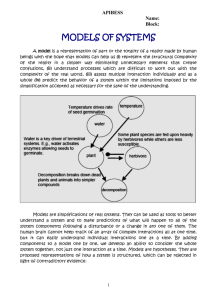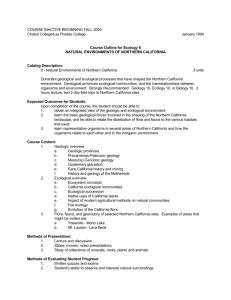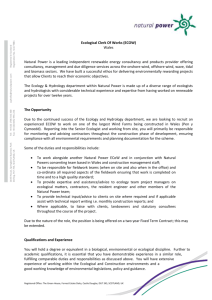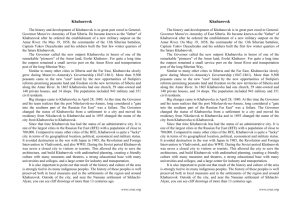downLoad
advertisement
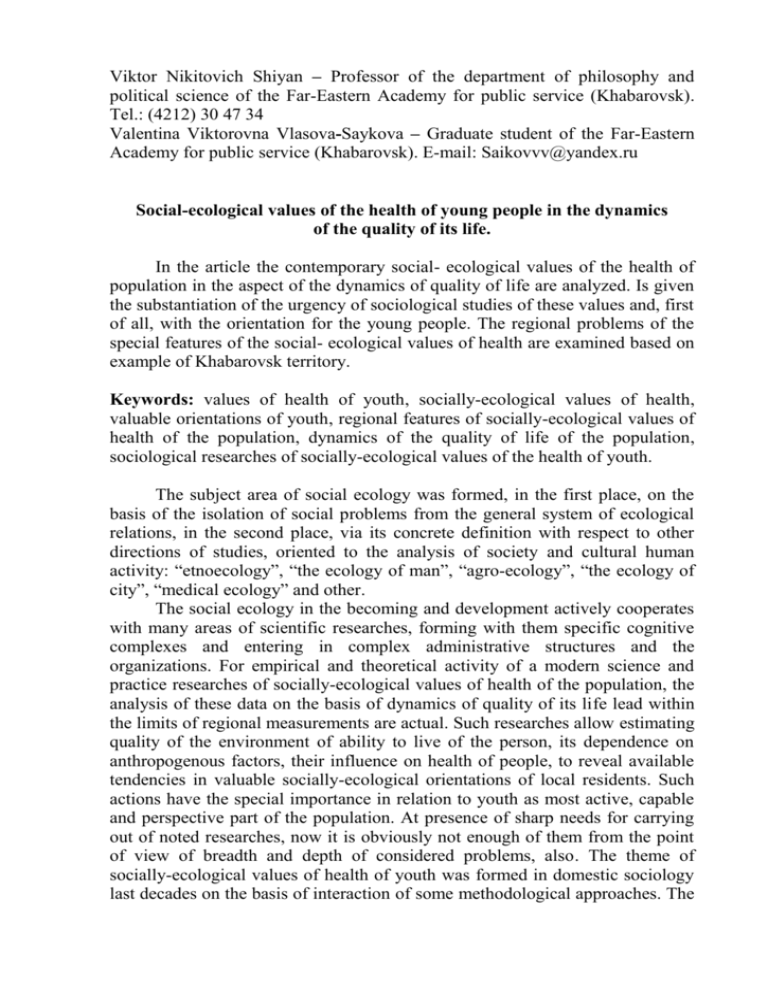
Viktor Nikitovich Shiyan – Professor of the department of philosophy and political science of the Far-Eastern Academy for public service (Khabarovsk). Теl.: (4212) 30 47 34 Valentina Viktorovna Vlasova-Saykova – Graduate student of the Far-Eastern Academy for public service (Khabarovsk). E-mail: Saikovvv@yandex.ru Social-ecological values of the health of young people in the dynamics of the quality of its life. In the article the contemporary social- ecological values of the health of population in the aspect of the dynamics of quality of life are analyzed. Is given the substantiation of the urgency of sociological studies of these values and, first of all, with the orientation for the young people. The regional problems of the special features of the social- ecological values of health are examined based on example of Khabarovsk territory. Keywords: values of health of youth, socially-ecological values of health, valuable orientations of youth, regional features of socially-ecological values of health of the population, dynamics of the quality of life of the population, sociological researches of socially-ecological values of the health of youth. The subject area of social ecology was formed, in the first place, on the basis of the isolation of social problems from the general system of ecological relations, in the second place, via its concrete definition with respect to other directions of studies, oriented to the analysis of society and cultural human activity: “etnoecology”, “the ecology of man”, “agro-ecology”, “the ecology of city”, “medical ecology” and other. The social ecology in the becoming and development actively cooperates with many areas of scientific researches, forming with them specific cognitive complexes and entering in complex administrative structures and the organizations. For empirical and theoretical activity of a modern science and practice researches of socially-ecological values of health of the population, the analysis of these data on the basis of dynamics of quality of its life lead within the limits of regional measurements are actual. Such researches allow estimating quality of the environment of ability to live of the person, its dependence on anthropogenous factors, their influence on health of people, to reveal available tendencies in valuable socially-ecological orientations of local residents. Such actions have the special importance in relation to youth as most active, capable and perspective part of the population. At presence of sharp needs for carrying out of noted researches, now it is obviously not enough of them from the point of view of breadth and depth of considered problems, also. The theme of socially-ecological values of health of youth was formed in domestic sociology last decades on the basis of interaction of some methodological approaches. The visible role among them belongs to the analysis of social qualities of the population on the basis of a deepening of economic interests of the state. Such methodology was precisely issued under influence of globalization of economic and political processes of a modern society. One their making element of such methodology the analysis of quality of a life of the population is. The term "quality of life" as the characteristic of ability to live of the person was fixed in the Russian social studies during its becoming and transformation in several directions. In the international scientific practice it began to be applied from second half XX of century. For the first time such system in which the parameters reflecting quality of a life of the population have been included, is presented per 1960 to information of the commission at the United Nations. It comprised Economic characteristics of ability to live of people that corresponded to values and priorities of the leading countries, branches and regions of the world economy. The further reference to quality of a life was accompanied by expansion and change of its parameters, and also a grouping of economic parameters around of such characteristic, as a standard of living. Last variant of this system of an estimation of quality of a life is developed in 1978. It included twelve basic groups of parameters, among which already Contained also such social, as health of the population. Parameters of a level and quality of a life represented the generalized empirical characteristics of social and economic conditions in the country [18]. In the subsequent practice of the application of indices of quality of life was revealed the tendency of the examination them within the framework of normative characteristics - for evaluating of the services given to worker and rewards with respect to the conditions of his labor. In the concept of universal management of quality and standardization of economic relations, including labor, quality is understood as the totality of the characteristics of object, which relate to its ability to satisfy the kept balance and assumed needs of the users of goods and services [1. p. 18.]. Understanding the quality of life of population is connected in this approach with human health as the important factor of his physical development and increase in the fitness for work, including the possibilities of expanding the formation. The selection of these factors of health is not random, since it contributes to the improvement of working, creative potential, to the realized relation to the selection of motives, purposes of activity, to the development of entire intellectual wealth of people. Attention to the theme of quality of life and its updating served as base for the attraction to its development of the specialists of different regions and directions of the study: economists, sociologists, psychologists, jurists, ecologists, managers, philosophers and other In the structure of quality of life were differentiated and integrated many relatively independent objective and subjective subject areas of a study, which made it possible to more deeply comprehend the content of this term. First of all, researchers noted its complexity, ambiguity and openness for further development. The Multiplan analysis of quality of life makes it possible to consider this sphere of the activity of society as the specific value of man. In consequence of which, natural becomes the definition of quality of life as the degrees of the correspondence of the basic parameters and conditions of the vital activity of man his vital needs, and also to his personal ideas about the worthy and valuable life [20]. The value nature of phenomenon indicates its general human, social, cultural nature, which has semantic, purposeful normative directivity. The values of population and social groups assign the priorities of the vital activity of people, system of orientates and estimations, determining in this way many characteristics of the social structure of society. In the values are concentrated the formalized and no formalized ideas, concepts, into varied “social” phenomena, functional formations. Understanding quality of life as values to a considerable extent enlarged the content and increased the level of its theoretical analysis, it contributed to drawing attention to it from the side of the empirical and theoretical directions of studies, including of sociological. Understanding human health changed with the passage to the value concept of quality of life. In it they began to more widely include such characteristics as social health, sociopsychological health, public health and the like according to contemporary ideas, human health characterizes his state, which includes not only the absence in it of diseases and physical defects, but also complete physical, sincere and social prosperity. The dynamics of quality research of life, turning to its varied characteristics, explanation of their systematization and deep interdependence made it possible to reveal cause-effect dependences between different states and interactions, which cause the empirical, normative and value sides of the vital activity of population. On this basis it is possible not only to describe their states, to fix qualitative and quantitative characteristics, but also it is goaldirected to influence them, impelling people to a change of its behavior in the favorable for them, therefore, and for the society, direction, to overcome the negative forms of activity, tradition, habit. The development of the socialecological values of the health of population is one of the directions of the use of preferable dynamics of quality of life. It includes the significant complex of scientific research sociological works, including collection and generalization of the necessary information about the initial state of the social- ecological characteristics of the vital activity of population, the determination of measures for a change in the directivity of behavior and activity of population. In the initial stages of quality research of life the generalized empirical indices of the health of population had weak bond with the social- ecological characteristics of the conditions of its vital activity. In the block of indices, dedicated to the health of population, were used such characteristics of working conditions as the boundaries of operating time, the established and actual duration of work week, the indices of occupational diseases, traumatism, frequency of accidents, their gravity, cases of mortality from them and some threats to health. To the group of social- ecological it was possible to carry only some indices of working conditions at the work site, such as dustiness, noisiness, the presence of vibrations, the monotony of labor and similar others. The transformation of the methodology of study and practical application of a concept of quality of life contributed to expansion - on the basis of the analysis of economic processes - those values of health and integration in them of number of the elements, which have social- ecological nature. Itself transformation as the form of development assumes a change in the system of social relations with the leading role of initiatives “on top”: the vertical line of authority, authority of policy, science, leading values of elite and the like, which subsequently are conducted into “the masses”, they are supported from the side of wide social institutes and as a whole - civic community. This mechanism of the evolution of understanding quality of life took preferred place with the propagation of the methodology of a study in the countries of the West. Already in 1980 the council of OECD (Organization for Economic Cooperation and Development) affirmed the list of the social indicators of OECD, in which together with others entered the characteristics of social medium, personal safety, explicit threats, physical environment (housing conditions, the accessibility of services, the damage of environment) and of others this tendency of the expansion of portion and strengthening of the role of the socialecological values of health in the dynamics of quality of life continued to be developed also subsequently. Domestic sociology actively uses methodology of quality research of life for the analysis of the state of Russian society and its application in control of social and economic and other sociocultural processes in the country [2; 3; 5; 6]. At the same time, the integration of the values of health with the socialecological processes was conducted by the different way: on the basis of the updating of the problems of the ecology of man, sociology of labor, sociology of health, legal ecology, economy of use of natural resources and this other way was very thorny. On it social ecology and sociology of ecology met many ideological, methodological “obstacles”. In spite of the formidable difficulties, existing in our country on the organization of the ecological sociological studies [15. p. 496 - 497], was conducted scientific analysis in the field of social ecology due to the state, in such cases of anthropogenic, environment [13; 14]. Into the post-reform period Russian sociology began actively to be turned to the methodology of a study of the social- ecological values of health in the dynamics of quality of life. The quality of life of population in its valuenormative measurement of health is investigated at the regional and municipal levels, one of which is Khabarovsk territory. The regional level of research of values of health of the population has the specificity which is determined both natural factors of the given territory, and welfare features of its ability to live. On a greater part of territory of Khabarovsk territory, especially in its northern breadthes, low temperatures of atmospheric air, its high humidity prevail, strong winds operate, and there are significant differences of atmospheric pressure. The long "winter" period and rather short summer, features of structure (under the maintenance of oxygen) atmospheric air and potable water (on concentration of fluorine, iron and of some other components), presence of set of blood-sicking arthropods (mosquitoes, ticks, etc.) . Prevalence in ground and landscapes of activators of dangerous illnesses, including, infectious, and many other things negative factors lower natural value of these territories for safe residing on it the person according to modern needs and values. With the general ecological conditions of the vital activity of the population’s directly interacted social- ecological, which characterize the diverse processes of the functioning of people (economic, technogenic, working, everyday and other), the results of the action on Wednesday of inhabiting and the quality of life of population, its health. To them should be carried the harmful ejections of industry and transport into atmospheric air, pollution by the harmful drains of surface and underground waters, everyday and production dumps, toxic smokes and dustiness in the territories of the stay of population, the state of drinking water and food products, the ecological parameters of household equipment and furniture, quality and safety of medicines, and also many other objects and the objects of the medium of the vital activity of people. Social- ecological processes acquire the specific content with the influence on them of other anthropogenic factors, in consequence of which they acquire complex social nature. Sociological studies testify that to the solution of precisely complex social- ecological problems the Far-Easterners return at present fundamental importance with the determination of the attractiveness of this territory for the stay on it and during the estimation of the quality of their life [7. p. 22 – 23]. The socially-ecological situation in region is influenced by the system which has developed in its territory of satisfaction of needs of the population: the established communications with suppliers of production and the goods, character of rendering of services, interest of manufacturers and suppliers in orientation to values of health of consumers, etc. Significant dependence of Far East consumers on import, remoteness of suppliers of the consumed goods and services raises their cost that limits opportunities of qualitative satisfaction the population of the needs. Orientation of manufacturers and suppliers of food production to additional incomes causes application of technologies with the high maintenance of sugar and other sweets, fats, preservatives and dyes, the flavoring and aromatic additives, specific thermal and physical and chemical processing of products with use of synthetic substances, etc., has fatal influence on health of the population. Not smaller harm bring subjects of a life and the leisure, made with infringement of ecological norms (a fabric for clothes and furniture, household building materials, materials for manufacturing books and the writing goods, sports accessories and toys, etc.). Changing an inhabitancy of the person, things used by it can bear in themselves socially-ecological property which reduce their value for health and worsen quality of its life. Feature of the modern organization of ability to live of the population, first of all youth, high dependence of quality of their life on the goods and the services created on the basis of import technologies is. On ability to live of the population of Khabarovsk territory essential influence renders its transboundary (economic, demographic, cultural, etc.) position. In preservation and development of quality of a life of the population effective interaction of manufacturers of the goods and services, legislative and agencies of authority, law-enforcement is necessary bodies, the public and other social institutes. The importance of sociological researches of socially-ecological values of health of youth increases in these conditions. Long-standing sociological observations of the Far-Eastern young people, her value orientations make it possible to draw the conclusion that the value of health possesses in young people steady high status [7; 8; 9; 10; 11]. Sociological studies give grounds for the determination of the tendencies in the dynamics of its values. As a whole the overwhelming majority (more than 70 percent) of young respondents stably note the priority value for them of the values of health [9. p. 23 – 25]. These data are confirmed by studies and other authors. At the analysis researchers of valuable orientations of youth observe change of structure of the factors negatively influencing its health. During last fifteen-twenty years in such interrogations the questions connected with smoking, a narcotics, alcoholism, specificity of sexual behavior, etc. Now a circle of these questions frequently prevailed has extended, including, due to fuller inclusion in them of characteristics of a socially-ecological orientation. On IV the All-Russia scientifically-practical conference " Youth of the East of Russia: the history and the present " values of health of youth were considered in researches of many authors. In them features of valuable orientations of modern Far East youth, influence on valuable installations of youth of dysfunctions of social system, the attitude to the health of student's youth of Khabarovsk, the valuable attitude of students to a healthy way of life, sociallyecological are analyzed values and valuable orientations of youth of Khabarovsk territory, change of factors of health in a life of youth, a problem of influence of technogenic pollution of territory on health of children and youth; influence micro biotic educational premises on health of pupils, influence on health of children and youth of their computer dependence, model and the national-state programs of struggle against a narcotics, a problem of struggle against a narcotize eyes of schoolboys, problems алкоголизации modern youth [11]. Similar wide "scale" of the analysis of socially-ecological subjects of value of health of youth became characteristic for modern sociological researches. It is possible to note its more concrete specific behavior under the real social- ecological conditions by another feature of the outlined changes in the ratio of young people to the value of health. The carried out by us in 2009 interrogation of young people of Khabarovsk, in which she participated on the whole by 800 youths (of about 40%) and girls (of about 60%) at the age of from 17 of years up to 21 year (82,6%), 22-25 years (10,2%) is above, it shows that the respondents know about the basic ecological dangers, which influence their health. Among more than hundred questions our form contained certain number of them, inverted to the development of social- ecological orientations to the health, the first of all social health and a healthy way of life, to the social nature of habits and traditions, utilized by individuals in its vital activity. The following answers were obtained to a question about the varieties of manifestation in the city of unfavorable ecological situations. Table 1 The unfavorable for the health social- ecological situations Characteristic of the unfavorable social- ecological situation Number of answer (%) High pollution of air 51,2 Low quality of the drinking water 81,1 Increased radiation 10,6 Precipitation of the acidic sediments 3,7 Presence of the natural focuses of the parasitic and infectious 10,0 diseases Another О,7 The content and the structure of answers is close to the real state of the influence of these social-ecological situations on the territory of Khabarovsk for the period of interrogation (March 2009.) To the request to estimate by them ecological situation in by Khabarovsk edge, 85,2% of that answered named it that causing alarm for the health. Only 4,8% of respondents designated their estimation of this situation as not causing alarm for the health. The young men having a high educational level that creates a basis for formation of their realized attitude to values of health and to socially-ecological conditions of the ability to live participated as a whole in this interrogation. Not finished secondary education of 3,3% have from them, the general average – 5,2%, an average special – 8,5%, not finished the maximum – 72,2%, the maximum – 2%. At the same time, attracts attention that fact, that interrogated have noted the most known to the present time the adverse ecological factors influencing health of inhabitants of Khabarovsk. They become a point of issue in mass media more often and are considered in system of ecological formation. Thus, the attitude of respondents to other adverse social factors-ecological influencing deterioration of the social environment is absolutely inadequate: decrease in quality of food stuffs, growth of rates of distribution of dangerous diseases (Cardiovascular, new growths, etc.), increase of a level of noise, etc. the Given fact testifies, that in competence of youth concerning socially-ecological values of health the significant place belongs to stereotypes of thinking. The analysis of the received results allows to offer measures on increase of efficiency of functioning of valuable orientations of youth, strengthening of their social orientation on health. We shall address to the following facts received from the analysis of results of sociological research carried out by us. Table 2 Valuable orientations of youth to social forms of satisfaction of the needs Social forms of satisfaction of needs (%) inclined to this form Prefer to take alcoholic drinks in the company of people (friends, 88,2 relatives, colleagues and another.) Consider what to smoke " group of people " more comfortably 53,8 Invite friends and other interlocutors during smoking " stay 52,5 beside " Prefer to eat in loneliness 12,6 Have got the first experience of the use of drugs in a circle of The Greatest friends (friends) part These facts focus organizers of a healthy way of life of youth on necessity of search and development social (Group, collective) forms of realization of values of health, expansion of practice of application of such forms in spheres of its work, leisure and a life. It is useful to have in family reference books on socially-ecological subjects of ability to live of the person, to form in family a healthy way of life, to attach to it children since the early childhood and to impart at them need to support health ecologically "pure" methods and means. In modern developments of values of health of youth some paradoxical situations when the real state of affairs appreciably does not coincide with public opinion or socially-psychological expectations in occasion of their actual condition are found out. Bases of paradoxical situations make: - Presence of heterogeneity of structure of youth on its qualitative potential, creative opportunities, a level of organization, subject activity (cognitive, behavioral, consumer, etc.) its separate social groups that creates preconditions for formation of hierarchically complex, multilevel system as values of health, and social norms-regulators corresponding them, norms-regulations, normsorientations, etc. - The presence of no uniformity and discrepancy in the trends of development of the values of the health of young people, the manifestation of relative independence in the transformations of these values and of their determining conditions. - The no coincidence of the estimations, which occur in the functioning of the general tendencies and states of the value of the health of young people, with their separate directions, the understated or overstated expectations in the estimations of the dynamics of such values. - The influence of the stereotypes of thinking, which occur in the system of theoretical and empirical sociology, on the forming of the public opinion apropos of state and tendencies of a change of the values of the health of young people in the dependence on the dynamics of the quality of its life. To the paradoxicalness of understanding the activity of young people, to the need for considering the action of this factor during the estimation of its behavior indicate other sociologists [19, p. 15]. The calculation of the paradoxicalness of young people makes it possible otherwise to approach the debating points, to specifically evaluate, it would seem, indisputable problems and situations, including the values of health. One of aspects of a taking place paradoxicality of a situation with socially-ecological values of health of youth of Khabarovsk territory should note significant discrepancy between presence of a rich environment of region which create opportunities for their reference on realization of value of health of local population, and a high level of a unsuccessful condition ecological, and, first of all, socially-ecological, conditions of territory for qualitative ability to live of people. Let's remind, that quality of a life means a degree of conformity of key parameters and conditions of ability to live of the person to its vital needs, and also its personal representations about a worthy and high-grade life. By the constitution of the Russian Federation it is fixed, that the Russian Federation the social state, " which policy is directed on creation of the conditions providing a worthy life and free development of the person " [4, p. 6]. By clause 42 of the Constitution of the Russian Federation it is guaranteed: «Everyone has the right on favorable environment a trustworthy, information about its condition and on compensation of the damage, caused to its health or property an ecological offence» [4, p. 14]. Well-known, that in practice given rule of law frequently has only declarative character. This paradoxical situation causes in the youth environment various discussions in occasion of a reality of norms of the ecological right, a degree of pithiness of ecological formation, a social orientation of practice wildlife management and a level of efficiency of regional measures on wildlife management. And, the youth expresses the created problem situation with inherent emotions for it and, quite often, more "sharply", than other social groups of the population during an aggravation of a unsuccessful situation (2007 – 2008) with ecology in pool. A cupid the youth has strengthened attention to this problem, participated in its various researches. Working group of Youth public chamber concerning conducting social and economic development at the Legislative Duma of Khabarovsk territory the question " About socially-environmental problems river basin the Cupid and ways of their legislative decision " on May, 26th, 2009 is considered. In the accepted decision attraction of youth to research of a socially-ecological condition of region is stipulated, to address to youth members of parliament of other Far East subjects of the Russian Federation about participation in the decision of environmental problems. Other aspect of a paradoxical situation with socially-ecological values of health of youth is the discrepancy which has shown in last years, on the one hand, between representations about its predilections for an alcoholism, tobacco smoking, to consumption of drugs, hobby for some other similar forms of the ability to live fatally influencing health of people, and, on the other hand, those real processes which proceed in the social environment of youth. Last years under influence of the youth social policy spent by the country directed on development of a healthy way of life, were generated and the corresponding social groups of the youth having certain specificity of vital values and norms of behavior, in particular, of change of culture of consumption of alcoholic drinks, reductions tobacco smoking, and references to drugs were well designated. There are they and in Khabarovsk territory. So, by results of our researches smoking consider itself no more than 27% interrogated young men, and with increase of age their share goes down, and 72% are convinced, that smoking is injurious to health. During too time, in a press results of sociological researches in which the share of smoking youth reaches up to 40 – 50 and above percent [10 are quite often resulted. P. 47; 11, p. 418]. New trends in behavior of youth not always operatively and in a sufficient measure are considered at carrying out of sociological researches. By virtue of available in methodology of research of values health of inertia and stereotypes of thinking the in concrete (unduly generalized) estimations are supposed. Developed dynamics of research of quality of a life expresses the fact of expansion and a deepening of process of reception of more and more diverse files of empirical data about ability to live of a modern society, promotes perfection of methodology of its analysis, involves in it new resources and additional means. Processes of research of quality of a life and the reached results form the basis for their further expansion and a deepening. Revealing of steady tendencies of change the values of the population arising on the basis of its adaptation to new conditions of ability to live and a positive reflection on them, create preconditions for the subsequent purposeful formation of values. The reference of the received results to the purposes and problems of current time carry out a role of preconditions for management of public attitudes, forecasting of the future condition of public attitudes and planning of measures on their realization in Khabarovsk territory such activity it is provided by development of strategy of social and economic development of the Far East and the Baikal region for the period up to 2025 [16]. One of the basic directions of fastening of resident population in region this strategy chooses improvement of quality of a life of local population. Among leading measures of improvement of quality of a life of the population perfection of socially-ecological conditions of the environment of ability to live of people is provided. Realization of these problems assumes the further perfection of sociological researches in system of socially-ecological attitudes, including and values of health of youth. This regional activity to correspond of general federation purposes and tasks of the development of Russian society in the program report to the congress of the party “United Russia”. V.V. Putin notes: “I consider it fundamental that, in spite of the problems, caused by crisis, we did not forego the strategic line in investment into the man, into the quality of life of citizens”. In the solution of problems by strengthening of the values of the health of population it are named the measures for an improvement in quality and accessibility of medicines, implementation of the programs of the preventive maintenance of the sharpest social problems, the adoption of standards on the enclosure of minor for alcohol, beer, smoking, and use of poor quality production. In this matter it is necessary to combine the efforts of specialists (physicians, teachers, and social workers), families, religious organizations and entire civic community. Necessary to more actively move the culture of a healthy way of life, to assume the development programs of gymnastics and sport in the regions, to solve housing problem, more completely using for this diverse possibilities of the legislative organs of the subjects of the Russian Federation [12]. The lead analysis allows drawing following conclusions. 1. Socially-ecological values of health of the population make now an essential subject of domestic sociological researches. The structure analyzer elements which are included into system of interaction of people with Wednesday of their dwelling extend. The importance of sociological researches of sociallyecological values of health of youth increases. 2. In sociological researches socially-ecological values of health of youth the significant role belongs to the analysis of conditions and practice of a regional level of its ability to live. Such analysis allows considering concrete problems of ability to live of young men of separate territories from positions of the general situation in the country, to estimate them proceeding from available and formed common cultural tendencies. In Khabarovsk territory sociological researches of socially-ecological values of health of youth are conducted. They tend to expansion and to deepening of the analysis of the phenomena and the processes menacing to its health. More and wider social layers of youth are involved in this process, subjects of such sociological researches are diversified. 3. Now there are a number of practical, theoretical and methodological problems which sanction will promote perfection of a socially-ecological situation in the country and regions. They are connected with necessity of strengthening of economic, social interests of the population in spheres of manufacture of the goods and rendering of services, orientations of values of ability to live of the population to formation of a healthy way of life. In this process the major value has strengthening mutual understanding of the subjects participating in creation and functioning of the environment of ability to live of youth. It is necessary to include more widely in programs of research of values not only the factors menacing to health of youth, but also favorable for it. Active search of social forms of dialogue of youth is required on to basis of a healthy way of life. 4. Sociological researches of socially-ecological values of health on the basis of modern methodology of the analysis of quality of a life allow integrating empirical, normative and valuable approaches to the decision of considered problems. Necessity of the decision of practical problems and developments of theoretical forms (concepts, models, projects) the further development of methodology of research of socially-ecological values of health of youth on the basis of the analysis of dynamics of quality of a life of the population of regions is staticized. Literature and the sources: 1. General Quality management: the Textbook for high schools / under pub.of O. P. Gluzina. – М. : radio and communication, 1999. 2. E. A. Davidov. Measurement of quality of a life / E. A. Davidov, V. V. Davydov.– 1993. 3. A. E. Kogut. Regional monitoring of the quality of life of the population / A. E.Kogut, V. E.Rokhin. – SPb. 1991. 4. The constitution of the Russian Federation.–: Pub/ACSMO: 2004. 5. L. A. Krivinisova. Quality management of the life of population / L. A.Krivonosova. – Khabarovsk : Pub. DVAGS, 2005. 6. A technique of an estimation of the quality of life: VNIITA, 2000. 7. Youth potential of the region: experience of the sociological analysis. – Khabarovsk: DVAGS, 2001. 8. Youth of the East of Russia: history and the present. Materials of the second inter-regional scientifically-practical conference 7 October, 2005 / Under red. N. M. Baikov and Y. V. Berezutskiy. – Khabarovsk: DVAGS, 2005. 9. Youth of the East of Russia: history and the present. // Materials of the Third All-Russia scientifically-practical Conferences. Part I / Under red.doctor of soc., prof. N. M. Baikov – Khabarovsk: DVAGS, 2007. 10. Youth of the East of Russia: history and the present // Materials of the Third All-Russia scientifically-practical conference. Part II. Student's scientific works / Under red. doctor of soc., prof. N. M.Baikov. – Khabarovsk : DVAGS, 2007. 11. Youth of the East of Russia: history and the present. Materials of IV All-Russia scientifically-practical conference on November, 24th, 2009 / Under red. doctor of soc., prof. N. M. Baikov and U. V. Berezutskiy. – Khabarovsk : DVAGS, 2009. 12. V. V. Putin. The Party of Century should participate in political strike actively. http // edinros.er/text.shtml? 10 / 9259, 110040. 13. A. Sokolov. About actual directions of socially-ecological researches / A. Sokolov, O. Yanitsky // Sociological researches. – 1982. – № 2. 14. I. A. Sosunova. Methodological and methodical bases / I. A. Sosunova. – М. : REFIA, 1987. 15. Sociology in Russia / Under red. Of V.A. Yadova. 2 pub. rework. And add. – М. : Publishing house of Institute of sociology of the Russian Academy of Science, 1998. 16. Strategy of social and economic development of the Far East and the Baikal region for the period till 2025. http:www.adm.khv.ru/invest2.nsf/General 17. The strategic plan of steady development of city of Khabarovsk till 2020. – Khabarovsk : Pub. The house "Priamurskie vedomosti", 2007. 18. D.V. Feoktistov. Methodology of an estimation of a level and quality of life of the population / D.V.Feoktistov // Taxes. Investments. The capital. – 2002. – № 3 – 4. 19. A.V. Shuliaeva. Feature of age differentiation of youth in system of socially-structural attitudes of a society (on an example of Khabarovsk territory). The author's abstract of the dissertation on competition of a scientific degree of the candidate of sociological sciences. – Khabarovsk: the TOGA, 2008. 20. www smartcat.ru/Referatxtweeramkc.shtml. 21. http // edinros.er/text.shtml? 10/9259,110040.




